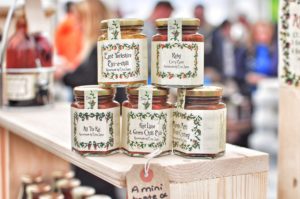by Jenny Rose | Dec 8, 2016 | Power
I’m thinking about money today. This is not new. Sometimes I think most of my life has been consumed by thoughts about money. Well, not thoughts so much as panic, guilt, shame and worry.

Photo by Teddy Kelley on Unsplash
There’s a heavy snowstorm here in central Maine. I’ve just been standing looking out my attic window, watching it fall on the huge elderly maples, bare as old bones, and the grass and the street and our little black Hyundai car in the driveway.
We found out this morning the car needs about $1,300 worth of work. Almost exactly what it’s worth. Time to make choices.
We went out to walk, my partner and I. I didn’t cover my head, and when we got home my hair and eyelashes were clotted with wet snow. My son, who had gone out to run errands, was backing into the driveway as we came home. He’d been meditating in a ditch, not being able to get in touch with us, after sliding off the extremely slick road and into a guy wire securing a telephone pole. Some kind soul drove by and pulled him back onto the road. Fortunately, my son wasn’t dented, but the car was. This, needless to say, does not improve the resale value!

Photo by Caley Dimmock on Unsplash
I also took time this morning to buy Christmas gifts, so I’ve been absorbing all the jingle bells, merry merry and buy buy online. Quite a contrast, all the glitz and glitter, deals and special buys and impossibly joyous advertising, to the silent world outside the window, grey, smoke blue, brown, dark green and the ivory snow. Over the years, I’ve done less and less gift exchange for Christmas. There are only two people left with whom I do it, not because I don’t love giving gifts but because of financial stress and my resentment of the pressure to consume.
I’ve always had a dreadful relationship with money. My earliest understanding of what it was became inextricably tangled with anguish, fear, rage and power issues. As a child, I was always afraid there wouldn’t be enough. As an adult, I was locked in a belief that money defined me. To have money was to be successful, and to not have it was to be a failure. There was a well-known and well-defined path to follow: Graduate high school with top grades and scholarships, obtain a college education in something employable and lucrative, get a job with benefits, and never NEVER touch the principal. If you must borrow, pay off ASAP and stay out of credit debt. Save for retirement, own your own home and pay off the mortgage, take vacations and have a nice car.
However, during my lifetime the world has changed considerably. The middle class from which I came has all but vanished. I didn’t want to go to college, but did it because it was expected. I didn’t get a good scholarship and felt guilty every day I was there, and my guilt was made worse by the fact that the only subjects interesting me were religion, literature, history and the like. After two years, I dropped out. (Note: Dropouts are NOT successful. Ever.) I’ve been working ever since.
Then I got divorced (credit card debt), saved for retirement but cashed a couple of those accounts for emergencies, lost all my investment money to a crooked contractor, never took a vacation or even a plane ride out of my own pocket, and never in my life bought a new car. Retirement? You must be kidding. What are the chances there will even still be social security by the time I’m 65?
This is in no way a remarkable biography, I realize, but for me there’s a red stamp across every page of it that says FAILURE.
I’ve only in the last two years really understood how much power I gave money to define who I am and what I’m (you guessed it) worth. The idea of monetary value, like sexism, is embedded in our very language. There’s no escaping it. In my culture, the failure to make and spend money in ever increasing amounts is unpatriotic, unattractive, unsuccessful and sometimes illegal.
This is all wrong. I feel like the little boy who said out loud the emperor had no clothes. Everyone was appalled and shushed him, lest the emperor hear and be offended.
I know myself to be an intelligent, heartful, creative, empathetic, honest person. The numbers in my bank account have absolutely nothing to do with those qualities.
The most important things in my life are my healthy relationships. Again, the numbers in my bank account have no influence over my ability to love and be loved and connected. (Hint: A relationship dependent on money doesn’t fit my definition of healthy. Just sayin’.)

Photo by Senjuti Kundu on Unsplash
My ability to be present, entertain joy, laugh, create and learn has nothing to do with money.
My enormous talent for life has nothing to do with money.
Unfortunately, our broken system does require money for health care and the necessities of shelter, food and water. To be human is to need these basics. Not having money for them is the experience of increasing numbers of Americans and the vast majority of others in the world. I myself don’t have the money to buy health insurance. Does that mean we’re all failures?
Of course not.
Not only that, but we’re exhausting our global resources and when no amount of money will buy food and water we’ll all starve together, regardless of our bank balances.
So, yeah, we’re going to have to figure out what to do with the car. We’ll have to get a loan and work on finding a good used vehicle that can deal with our weather. It will mean a monthly car payment. No idea how we’ll do it, but I know we’ll find a way. Before that, we may have to do some work on the Hyundai in order to get top price for it.
But none of that is about me, or what I’m worth in the world, or what I can do or be. It’s all just static and distraction. It’s not failure or success, it’s just that cars age out and need to be replaced. If I could go out and buy a brand-new Subaru, it wouldn’t be failure or success, either. It would be CONVENIENT and LUCKY.
Here are a couple of Christmas presents from me to you. The first is a quote and the second is an old wisdom tale from the Hindu tradition, one version of which is in More Ready-To-Tell Tales from Around the World, edited by David Holt and Bill Mooney, and told by Jim May.
“It is no measure of health to be well adjusted to a profoundly sick society.”
–Jiddu Krishnamurti
The Ruby
A holy man awoke, as usual, in the hour before dawn, on his mattress of grass. A warm wind moved across the land, bringing the scent of dust, animals, early morning cooking fires and blossoms, fresh and sweet in the cool morning.
The holy man was beginning his morning prayers when an excited young peasant ran up to him. “Master, where is it?”
The holy man raised an inquiring eyebrow.
“I had a dream,” said the peasant, calming himself. “In my dream, I met a holy man at the edge of the village. And here you are! The holy man gave me a precious jewel.”
“Ah, yes,” said the holy man. He bent and pulled from beneath his mattress of grass a ruby the size of his fist. “You must mean this. I have no use for it.”
He handed it to the peasant, who had never held more than two copper coins in his hand. The peasant raised the ruby between himself and the rising sun and his awed face was washed in red shadow. He walked slowly home, his eyes fastened on the ruby. He entered his simple hut and sat down on the dirt floor with the ruby before him.
All day he gazed, enchanted, and dreamed of what the ruby could buy him. He forgot his morning prayers. He didn’t eat, bathe, or take care of his livestock. He didn’t scythe grass for hay. When night came, he didn’t say his evening prayers, make a meal or lie down and rest. He sat before the ruby, worshipping.
The next morning the peasant took the ruby in his hand and went out, searching the fields for the holy man. When he found him, he handed the ruby back to him.
“This is not the precious jewel I want. Teach me what you know that made it so easy for you to give it away.”
All content on this site ©2016
Jennifer Rose
except where otherwise noted
by Jenny Rose | Oct 6, 2016 | Power
The late John O’Donohue, a wonderful Irish poet and mystic, wrote a book of blessings titled To Bless the Space Between Us. I discovered O’Donohue via Anam Cara, perhaps his best known work, more than ten years ago. This idea of blessing the ground between us has stayed with me, especially this summer as I’ve worked with boundaries. See the first posts in this series here, here, and here.
It’s a beautiful autumn day in Maine, and I find myself alone, which rarely happens. An old stone wall borders one perimeter of our 26 acres here, and I decide to walk it.
The wall is really just a hump of stones now, covered in moss. It runs through thick growth, so there is a lot of dead wood to maneuver around. The neighbor has posted signs on the trees on his side of the wall every few yards, yellow signs saying “No Trespassing.” The relentless message follows me all the way down to the river.
The ferns are golden now, responding to diminishing light. Brush and bracken are a mixture of dried flower heads, sprawling vines and fallen leaves. It’s been very dry, so numerous small stream beds are empty, but I can see where water runs when it’s present. I slither and bushwhack all the way down to the river, where a handy fallen tree makes a bench above the water. The river hardly moves, low and clear, and I sit for a time watching leaves fall onto its surface.

Photo by Aaron Burden on Unsplash
The ground between one person and another, one property and another, can’t exist unless there are defined boundaries. I appreciate our neighbor’s desire to keep his land inviolate. Even without the signs I wouldn’t trespass, not being that sort, but something about the repeated warning above the old disintegrating wall disturbs me in the context of the patient trees and turning season. The wall, like a hedgerow, is probably home to many. It’s a beautiful boundary, that wall, much more interesting than a fence, and at this point much more organic, too. You might say it’s a beautiful blessing.

Photo by Robert Hickerson on Unsplash
I’ve been in relationships where the ground between us was perceived as a threat, or even a rejection. This particular boundary issue quickly damages connection if I intend to keep that sacred ground between us and the other tries to eliminate it. I don’t want to trespass, but I also don’t want to be trespassed upon. Yet I don’t want to live in an armed fortress. I don’t want the ground between us to be a military zone, seeded with landmines, soaked in blood and tears, noisy, dangerous, ugly and foul. I don’t want to build a fence with glass and razor wire between us. I don’t want the ground between us to be a toxic dump, or filled with shattered shards of broken integrity and betrayal.
Then there are relationships where lip service is paid to the ground between us, but the phenomenon I call boundary creep comes into play. Slowly, inevitably, a tide of invasion inches over the boundary. It might be in the form of noise, or in the form of things like clothing, mail, dirty laundry and personal possessions. It might be in the form of toothpaste in the sink, hair in the drain and grease on the stove. It might be in the form of detritus generated by an addiction, like beer cans, cigarette butts or drug paraphernalia.
I’ve also been in relationships where I’ve tried to make dates with people, with the two-fold intention of being fully present and available at a certain time and place for connection and managing my own time and energy effectively, but this can be very problematic. Some folks are chronically late or intermittent no-shows. Others are highly offended at having to make a date, preferring to have access to me whenever and however they want. Then there are people who only want connection on their terms. I’m not allowed to reach out in any way and can only wait for them to initiate contact and set the boundaries.
When I think about blessing the ground between us, I envision a park, or maybe a garden. A place with trees in it, and birds, and leaves and maybe some moss. I imagine a place we both create and care for, a safe and sacred space in which we experience reciprocal respect and affection. I like the idea of a stone wall or some kind of fence, but I want a gate in it.

Photo by Colin Maynard on Unsplash
At this point in my life, after years and years of confusion and pain around boundaries, I’m finally getting crystal clear. I know what I want, and I know what I don’t want. Observing how people handle boundaries and the ground between us speaks volumes about their priorities, their choices, the state of their integrity and self-esteem, and their level of functioning. Notice I say observation, not listening. Actions are always more telling than words. Someone with broken boundaries is certainly not going to help me maintain mine.
I can’t control what others do with the ground between us, but my choice is to bless it with growth and kindness, respect and safety. I intend my boundaries to be both intact and beautiful. My boundaries have doors and windows and gates so the light of my healthy relationships can bless my life, but those doors and windows and gates can be locked if the need arises.
I am not you and you are not me. Together, we are greater than we are individually. We can choose how to create and decorate our boundaries. We can choose to bless the ground between us.
All content on this site ©2016
Jennifer Rose
except where otherwise noted
by Jenny Rose | Sep 29, 2016 | Power
I’ve been thinking about this week’s post for a couple of days now. There’s a lot more to say about boundaries than I’ve discussed here and here, and maybe someone else can shape the many complex pieces into separate, coherent posts, but that person isn’t me. I can sort out a few points, but the rest is chaos containing all kinds of inflammable issues, such as parenting, corporal punishment, our justice system, religion, sexuality, morals, ethics, rape culture, racism, entitlement and patriarchy.
There’s no doubt in my mind that these are important discussions and ideas for all of us, but the purpose of this blog is not to have a shouting match or explore the different ways we can criticize, judge and belittle one another.

Photo by Andrew Loke on Unsplash
I suspect most of us agree boundaries are necessary, but after that point I see potential for endless violent disagreement about how and why we create and manage them. I believe it’s safe to say our understanding of boundaries is heavily influenced by our childhood experience, our culture and family, and technology and media.
I have no answers. I notice what I call my boundaries don’t work very well at times. I notice the conflict between what works for me, what others expect, and what I’ve been taught. I notice a generation gap around boundaries. My 20-something sons see the whole issue differently than I do. I think some of this is due to differences in our relationships to technology, but I don’t know how much.
I also notice a lot of my boundaries are around fear. As a single woman, I’m uncomfortable with the idea of being hooked into GPS and map information via technology. It doesn’t feel safe to me. Likewise, I’m uncomfortable discussing my spirituality, my parenting beliefs, my political beliefs, my dietary choices and the color of my underwear. I’m not ashamed of who I am — I’m afraid of being victimized. I don’t want to deal with mean, hateful or dangerous people. I don’t want to attract the attention of a psychopath or a sociopath. I don’t want to lose connections and relationships over something like religion.

Photo by Mike Wilson on Unsplash
Then there’s the part of me that simply isn’t interested in what I call oversharing. I mind my own business — why can’t everyone else mind theirs?
On the other hand, surely we have a right to be who we really are. But where is the line — the boundary, if you will— between that right and violating someone else’s boundary?
A highly topical example of this is the debate over Native American team names in the public school system. Many Native Americans find this offensive and racist — and say so. The other side hotly denies they’re racist and cites tradition and their intention to honor the Native American people. It’s a ding-dong argument. I’m hurt and offended and this feels racist versus I am not a racist, back and forth, on and on, with both sides becoming further divided with every iteration. Broken connection, broken relationships, divided communities, hurt and rage are the result.
At bottom, it seems to me these are all boundary issues. Our boundaries don’t appear to work well. What can we do about that?
This very morning, I had an interesting discussion with one of my sons about this. We were talking about privacy in regard to technology, and he suggested that soon we may have to accept the idea of 0% privacy because of our increasing reliance on and use of technology. Everyone (at least in this country) will be equally exposed and we’ll have to figure out how to live with that exposure as a culture and move on, or we’ll simply self-destruct. I’d never considered this point of view and I’m fascinated with it, as well as slightly appalled.
Perhaps the chaos around boundaries is present because, as my son suggests, we’re in transformation. Transformation is inherently chaotic, after all. Maybe my generation’s ideas and beliefs about boundaries aren’t working because they’re outdated. Our world, our culture, our understanding of life, technology and science are dynamic, always changing, always correcting and expanding. Perhaps the world we live in today requires different boundaries and we’re struggling to shape them.
At the risk of sounding like an old granny, however, I think healthy, effective boundaries must contain elements of respect, compassion, authenticity, dignity and kindness, not only for others but for ourselves. I think it’s important to remember that boundaries are about ourselves and what works and doesn’t work for us. It’s not our job to choose boundaries for others. We may have to defend our boundaries and others will certainly try to violate them, but that’s the only place our power is.
Interestingly, I’m reading a book right now that relates to this. It’s called Being Wrong by Kathryn Schulz. It’s a great book — well written, funny, intelligent and thought-provoking. I highly recommend it. The reason I mention it is that so many of our rules, expectations and yes, boundaries, are based on our beliefs and we have a tendency to make our beliefs universal laws. We all do this, one way or another. But take one of your central beliefs, a hot one like politics or diet or religion, one you argue about on Facebook, block and unfriend people for disagreeing with. Now just imagine, if you can, for one minute, only 60 seconds, that you’re wrong.
Pretty uncomfortable, right? Now everything changes, including your rules, expectations, stories and, inevitably, your boundaries.

Photo by Alessio Lin on Unsplash
In other words, effective boundaries need to flex and change as we learn and grow. Otherwise, all we create is a jail cell for ourselves. We can’t change, we don’t admit new information and we keep ourselves small and rigid.
On the other hand, if we have inadequate boundaries our power is leaking all the time. We fall prey to dysfunctional relationships, our integrity breaks, we fail to take care of ourselves, and our lives don’t work well.
All content on this site ©2016
Jennifer Rose
except where otherwise noted
by Jenny Rose | Sep 22, 2016 | Power
This is the second of I’m not sure how many posts about boundaries. See last week’s post for the beginning of the discussion!
Today the aspect of boundaries I want to explore is the one I have the most trouble with. This aspect concerns managing boundaries with people we love.
Continuing with our metaphor of food on a shelf, last week I was comfortable with my identity of strawberry jam. I know who I am, I’m in an intact container (most of the time) and I intend to be labeled accurately and effectively. That’s all INTRApersonal start-where-you-are work.
However, there’s other food on the shelf. The universe doesn’t revolve around strawberry jam, alas! In fact, next to me is a jar of dill pickles.

Photo by Viktor Forgacs on Unsplash
We’ve been together as long as I can remember, sitting side by side on the shelf. We’ve watched other food in other containers come and go. The eggs in particular have quite the turnover rate. We’re companions, friends, and in fact it’s not an exaggeration to say I love Pickles.
But one day I notice something has changed. The clear green juice in the jar with floating bits of herbs and spices is getting cloudy. And is that — could it possibly be — grey fur along one side of a pickle?
Disaster. Catastrophe. It can’t be true. My beloved Pickles is beginning to grow fur. Everybody on the shelf knows what this means. Sooner or later, the refrigerator/cupboard/shelf Gods will cull Pickles. Gone forever.
I can’t imagine my life without Pickles.
Naturally, I want to help. No kind of food could possibly want to wear grey fur. There must be something I can do.
If I love Pickles, I must be able to fix this.
If I really, truly love Pickles, and my love is real and unselfish and unconditional (and Pickles is worth that kind of love), there’s a way for my love to fix this.
If I fail to fix this, my love is at fault.
That, ladies and gentlemen, eggs and bacon, is where I lose my boundaries. It’s all very clear and self-evident when it’s laid out in black type on the page, or in this case, screen. Love can’t fix everything. Love isn’t always enough. Sometimes we can’t “help” other people. Bad things happen to good people all the time. Loss is part of love. Right?
My brain understands this. My brain functions pretty well. My brain is not the problem. It’s my heart, my emotions, my stories, my beliefs and my expectations that are unruly and stubborn.

Photo by juan pablo rodriguez on Unsplash
Perhaps I haven’t explained it well, my connection with Pickles. I know him better than anyone. I understand him. He’s the most important person in my life. He’s part of who I am. If I lose him, I’ll lose part of myself. I thought nothing could ever part us, or damage our respect and trust in one another. In fact, we’re so close we don’t need boundaries.
(Naturally, he feels the same way about me. He doesn’t say so, but one doesn’t expect pickles to emote like strawberry jam.)
Loving fully and unconditionally means no boundaries, right? Isn’t that what we learn? If we love unselfishly, completely, without reservation, then boundaries are unnecessary and we can count on getting that same kind of love in return. Loving well equals being well loved. Isn’t that the way it works? Only a selfish bitch maintains boundaries, an unloving, cold woman, a ball breaker. Only an indifferent, unfit mother maintains boundaries between herself and her children. Only a judgmental, critical, power-hungry female protects herself with boundaries. Generous, attractive, truly loving people have no need of boundaries. They don’t count the cost. They always say yes. They give freely of their resources to whoever is in need without expectations or strings attached. They never keep score. They have no needs, these lucky, healthy, beautiful, abundant people. They feed and nurture the world.

Photo by Jordan Whitt on Unsplash
Boy, does this world need people like that. That’s the kind of woman/friend/mate/mother/daughter/sister I want to be. If I want to save Pickles, that’s the kind of person I have to be.
Here’s the thing.
I can’t be that. I’m not sure anyone can be that.
I’m not talking about ideology here. I’m not qualified for or interested in religious debate. What I’m saying is I can’t be a bottomless, endless nurturer and giver with no needs, and I’m not convinced anyone else can, either. I know some who say they can, pretend they can and/or expect others to be, but I’ve never met anyone who really lives like that — at least not long term. Not successfully and not happily, anyway.
But aren’t we supposed to?
Did I learn this wrong? Did I misunderstand? I can’t point to any one person who taught me this, after all. Did I make it all up? Or, alternatively, am I not the woman I think I am and aspire to be? Am I small, mean, petty, hypocritical and selfish? Am I unable to love the right way? Am I a fraud? Am I self-deluded?
Why am I in such chronic painful confusion about something my intellect sees so clearly? Why does it seem that managing boundaries INTERpersonally carries such a negative connotation? Why can’t I reconcile loving someone with all my heart with effective, appropriate boundaries between that person and me? What is the source of this cognitive dissonance?
Which is more devastating — people who have no boundaries themselves and bitterly resent mine, or people who maintain boundaries between us when I have none?
In the first case I feel trapped, resentful and intruded upon, and in the second I feel hideously rejected, unappreciated and used. Neither feel like healthy connection, but I call both love.
So here I am, side by side with Pickles on the shelf. We look at each other through the glass sides of our boundaries. I want to climb inside his container and take him in my arms, love him back into clear green juicy health, but if I do that I’ll start growing gray fur myself, and I know I can’t fix him at the same time I believe I should be able to. I want to run away, turn away, not know what’s happening, but I can’t.
There’s nothing I can do. My love is not enough. Grey fur is creeping over Pickles and I can’t avoid it, flee it or stop it. I can only wait and watch and sit here in my container, while Pickles sits in his.
RIP, Pickles.
All content on this site ©2016
Jennifer Rose
except where otherwise noted
by Jenny Rose | Sep 15, 2016 | Power
Since I began this blog I’ve wanted to write about boundaries, not only because I myself am trying to develop better ones, but also because it seems to me boundaries are a large part of what’s broken in our culture.
We’re all aware of headlines from all over the world about human rights, ethnic and racial struggle, politics, sexual identity, religion and war. It seems to me boundaries are a core piece in each headline; an enormously complex piece of human function and dysfunction. How do we define, understand and effectively manage boundaries — both our own and those of others? How do we manage people who consistently violate our boundaries?
Trying to organize my thoughts about this is like trying to herd cats. That being said, I can choose a starting point, so I’m going to start there and see if the subject organizes itself as I write.
I approach most subjects with a definition and curiosity about what others are saying about it. A Google search for “boundary” tells me it’s a “dividing line.”
I’ve read two articles recently about boundaries. One is written from an emotional intelligence perspective and one is about human rights, kind of a sidewise look at boundaries through the idea of respect. Both have contributed to my mental soup on this subject.
My experience is that any piece of human function or dysfunction begins with myself. Self-reflection and self-inquiry are powerful tools for me, even though I occasionally wince at what I find!

Photo by Annie Spratt on Unsplash
So, let’s play a game. Open your refrigerator, or your pantry, or your cupboard. Look at a shelf where you keep food. Everything is in a container. The container around the food is a boundary. If none of that food had boundaries around it — well, that would just be a mess.
As we start thinking about boundaries from ourselves outward, let’s take a jar of strawberry jam. It’s a glass jar with a screw top lid and it’s clearly labeled strawberry jam. Effective boundaries, it seems to me, begin with a correct identification of what’s being contained. We have to know who we are before we can create healthy boundaries, because our boundaries won’t look like someone else’s. They’re not one size fits all. You can’t keep strawberry jam in an eggshell. You don’t want raw eggs in a jar labeled strawberry jam. A can with the label torn off could still be food, but it’s hard to use it effectively.
Mislabeling happens in two directions. There are those externally who tell us who we will, should or must be (or who we will, should or must NOT be), and there are our own internal expectations of who we are and what we need. If something goes wrong right here, at the first step of boundary work, we’ve got problems.
This takes us directly back to several dynamics I’ve posted about — expectations, stories, saying yes and no, and pleasing people among them. My experience in my own western middle-class culture has been painful pressure to be who I’m expected to be, not who I really am. If this can happen to me, a straight, white, average-looking, average-sized, able-bodied, unambiguous female, then I know hundreds of thousands of people out there are being systematically emotionally and spiritually maimed in ways I can’t begin to fathom.
This opposition to knowing and being ourselves is everywhere. Capitalism is based on the idea you’re not okay as you are, but you will be if you buy…whatever it is.

Photo by Viktor Forgacs on Unsplash
I’m strawberry jam. I’m not grape jelly, even though it’s more valuable. I’m not blackberry jam, even though it’s more attractive. I’m not raspberry jam, even though it’s more popular. Go ahead, glue a label on me that says “currant jelly.” I’m still going to be strawberry jam, and my true boundaries are a glass jar with a screw top lid and a label that says strawberry jam.
As cruel as it is, the external pressure we feel to be other than we are is not the most damaging thing. The most damaging piece is what we do internally to ourselves. I can spend my whole life with my fingers in my ears and my eyes squinched shut saying I’m peanut butter, but I’ll always be strawberry jam. Other people will know it. I’ll know it. Nothing will ever work for me because I’m in the world trying to be something I’m not. I won’t find my people. I won’t find my place. I won’t figure out and make my contribution. I won’t have effective boundaries. I won’t be happy.
Not only that, but my inability to manage and maintain effective boundaries affects everyone around me. If my jar is cracked or broken, strawberry jam is going to ooze out onto the shelf. It’ll make a mess. It’ll attract pests and predators. It’ll be wasted and it will impoverish the peanut butter, the toast, the butter and whatever else might have connected with me as strawberry jam.

Photo by Jonathan Pielmayer on Unsplash
In order to have healthy boundaries we have to know what we need. In order to know what we need we have to know who we are. Finding out who we are can be a terrifying prospect, especially if we’re captive to what other people, media, our culture, and most of all ourselves tell us we MUST be in order to get loved and find happiness, meaning and purpose.
I have made up my mind I will build better boundaries. I will figure this out. If anybody out there will walk beside me, I’ll be very pleased. I know I’m not the only one struggling with this. In fact, I don’t know anyone who doesn’t have trouble with some piece of it.
My starting point is right here, with myself. I’m strawberry jam and my boundaries are a glass jar and a screw top lid. My label says strawberry jam. I’ve no interest in forcing, persuading or coercing anyone else to be strawberry jam. I just know what I am. It might be that strawberry jam is outlawed, shunned, shamed, beheaded, tortured, raped, imprisoned, damned to Hell, unsaved, unenlightened, unlovable, unwanted, unworthy or lined up against a stone wall and shot under a hot sun. I’ll still be strawberry jam. I’m not confused and I’m not going to feel ashamed about it.
Peanut butter and strawberry jam sandwich, anyone?
All content on this site ©2016
Jennifer Rose
except where otherwise noted
by Jenny Rose | Sep 8, 2016 | Power

Photo by Bewakoof.com Official on Unsplash
I recently had a discussion with a young friend who’s going through a hard time.
I listened and asked questions, and did my best to enter into her experience. My agenda wasn’t to rescue, fix, or advise, just to let her know I cared and help her think about options.
My intentions were good, but I walked away feeling as though I’d only irritated her and made things worse. Ever since, I’ve been questioning what I said and how I handled this interaction. Was I patronizing? Condescending? Obnoxiously optimistic? Aggressively parental? Didn’t I listen well?
Or maybe my questions were the problem, not because they were bad questions but because they were good questions. I’m reminded of people in my life who have approached my distress with the kinds of questions that made me want to hang up the phone or slap their face. Their questions challenged me to break out of the shrinking cage I was in. They challenged me to take control, take responsibility, face my fear or think outside my usual box.
I’m not sure why, but when I’m good and miserable, or at panic stations, or swept up in powerlessness, I want someone to agree with me. It’s hopeless. I’m helpless. It will never get better. I made mistakes, bad choices, stupid decisions and now I’m paying a price I deserve to pay. I’ve dug a hole so deep I can’t get out without some kind of divine intervention. I have to wait for someone to rescue me.
Sitting here writing this it sounds silly, but it’s not silly when I’m in it. We’ve all had times like this. What I know is that my best friends in crisis are the ones who metaphorically kick me in the butt. They won’t walk down the pity path with me. They won’t agree that it’s all over because I screwed up or made bad choices. They don’t admit the past was apocalyptic and the future will be catastrophic.
These people keep redirecting me back to what I can do right now to help myself, and away from everything else, and sometimes they’re not gentle about it.
This is tricky because it’s counterintuitive, at least to me. When I’m faced with a problem, I want to square right up to it, obsess, throw myself at it, beat my head against it and leave the rest of my life unoccupied. It’s either an all-out wrestling match or I eat ice cream out of the carton (a big carton!), stop taking showers, binge watch ‘Buffy the Vampire Slayer’ all night and sleep all day.
Neither of these approaches has worked for me. The only thing that has ever worked is to identify where my power is right now and let the rest go. I don’t know why that works. I don’t know how it works, but I know it does.
When I was a low-income single mom, what this meant was realizing summer was ending and the boys would need new winter coats I couldn’t afford, and we would need groceries a lot sooner than that, but I had no money. And yes, I was working. At one point I worked two jobs and attended school.

Photo by Mitchell Orr on Unsplash
Anyway, I developed a habit of shaping the day around what I could do instead of what I couldn’t do. I tried not to think about the next day, the next week, the next winter. I figured out what we’d eat that day from what we had, and I did what I could do — all the things that can be done without money. Like playing with Legos on the living room floor, or taking a walk, or reading aloud to the boys, or doing laundry, or working in the garden, or scrubbing the kitchen floor.
Some days were so hard I just lived five minutes at a time. It was all I could handle.
My kids are in their twenties now. All those five minutes, all those one-day-at-a-times passed and we weren’t homeless, we weren’t without food and we always managed winter coats, thanks to Goodwill. I have no idea how it all worked. I didn’t know then and I don’t know now.
Now, it’s true I found jobs, got trained and educated, did without things like cell phones and cable TV. I did what I could to help myself through those years, and I had a lot of outside help, too. But my point is I tried not to get stalled with my nose touching a brick wall. I tried to look in another direction — in a direction where I could make choices. Doing that didn’t make the brick wall disappear, but somehow it allowed me to move past it.
Getting back to my friend, I tried to ask questions about where she did have power, but she felt powerless in every direction and the questions only reinforced the feeling instead of helping her reconsider her situation. I left the conversation feeling upset and frustrated and decided I needed to take a step back, give my friend space and let it all unfold.
Interestingly, in the time between that conversation and this minute, my friend got what she needed from someone else, made some hard choices and now sees her way ahead, at least for a few steps.
What I’ve learned from this is that no matter how much I love and care for someone, no matter how much I want to share what I’ve learned in life, sometimes I just can’t be useful or effective. That doesn’t mean, however, that my loved one won’t get what they need from someone else. I’m trying hard to persuade myself this doesn’t make me a failure, but it’s uphill work. Additionally, I have a sneaking suspicion that part of what I feel is nothing more than injured pride. As long as I’m confessing, there might be jealousy in there, too.
I’ve also relearned the thing I wanted to teach. It was clear to me I couldn’t be an effective support to my friend, I couldn’t make her feel better, I had nothing to offer she could use. However, two cords of wood were sitting in our driveway, so my partner turned on music and we stacked it in the barn. He and I cleaned out a closet and I got my fall/winter clothes handy. I was scheduled to work on Labor Day weekend and the day after, so I showed up for work and did my best. I wrote a few pages of my current book and I wrote this post. Today I swim. It was in the middle of all this that my friend came to me with the beginnings of her own solutions to her own problems.
Maybe my love and concern were only an added pressure for my friend. Maybe the most helpful thing I did was step back and live my own life. That, after all, is where my power is.
I just wish it didn’t feel so inadequate.

Photo by Jan Phoenix on Unsplash
All content on this site ©2016
Jennifer Rose
except where otherwise noted
















